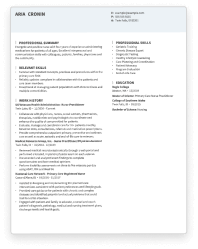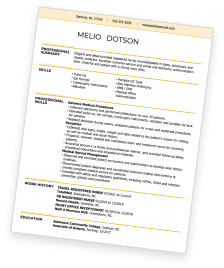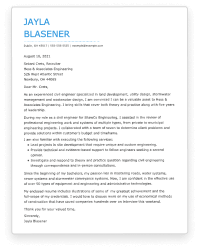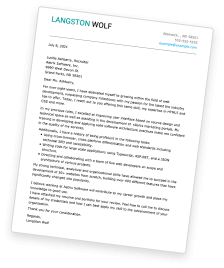Research Assistant Resumes: Overview
As a research assistant, your job duties can change daily according to the needs of your team. Your typical responsibilities include collecting experimental data, fact-checking and proofreading manuscripts, maintaining research equipment, and documenting research processes.
Research assistants work in a variety of organizations, such as:
- Academic Research Centers
- Pharmaceutical Companies
- Healthcare Institutions
- Government Research Agencies
- Non-profit Organizations
- Private Research Firms
Successful research assistants are skilled in data collection, analysis, and attention to detail. Employers seek candidates with excellent organizational skills, a solid understanding of research methodologies, and the ability to work well in a team.
The first step to getting the research assistant job you’ve always wanted is crafting a resume that stands out from the competition.
Explore our helpful guides, resume examples, and downloadable templates tailored to a research assistant role to get started.
Research Assistant Resume: Choose a Format
Before writing your resume, you should choose a resume format. There are three resume formats for a research assistant resume: chronological, functional, or combination.
Selecting the best format to showcase your experience and qualifications is crucial to getting an employer’s attention.
Chronological Resumes for Research Assistant
A chronological resume format is the most popular choice and is recommended for most job seekers.
A chronological resume works especially well for an experienced research assistant.
A detailed chronological list of your previous jobs gives potential employers a comprehensive picture of your career journey.
Then, bulleted sentences beneath each job entry allow you to detail your research projects, publications, and accomplishments to demonstrate your ability to do the job.
The chronological resume format is the most sought after by employers because they place a high value on seeing how your experience demonstrates your skills. Therefore it is the most friendly for applicant tracking systems (ATS) and the most recommended format to use for a research assistant.
However, it should be noted that this format can be challenging for a student or recent graduate with limited work experience who may want to consider other options.
Functional Resumes for Research Assistant
A functional resume may be a good choice for an aspiring research assistant to emphasize skills instead of work history.
This format allows you to prominently showcase your expertise in laboratory techniques, data analysis, and scientific methodologies without tying it to a timeline or previous job role.
A functional resume makes it easy for employers to identify your most relevant qualifications, particularly when skills are a priority.
While this format can work well for students, recent graduates or those with diverse job experience, it does have some potential drawbacks.
Employers value your previous work experience and may prefer a detailed work history section. Also, a functional resume is incompatible with most applicant tracking systems (ATS), which could hurt your chances of seeing your resume by a hiring manager.
Combination Resumes for Research Assistant
The third option is to mix elements of chronological and functional formats with a combination resume. This approach lets you highlight specific skills crucial to the research assistant role while also providing a detailed chronological work history.
This format works well for someone with limited experience as a research assistant because it equally emphasizes skills and work history.
However, this format may result in a longer resume. Exceeding the recommended length of 1-2 pages can hurt your chances of getting noticed by busy hiring managers.
Choosing a Resume Format
Choosing the best format to put your skills and experience level in the best light is critical to crafting a winning resume.
When in doubt, a chronological format is generally safe and ATS-friendly for research assistants. Even if you lack relevant job experience, you can tailor a chronological resume to emphasize transferable skills and qualifications.
For example, suppose your previous jobs involved communicating with a team, proofreading communications, organization, or data analysis. In that case, you can showcase that in the bulleted sentences in your work history to demonstrate your abilities.
How to Write a Research Assistant Resume
Once you decide on a resume format, it is time to focus on crafting your content. From contact information to education and skills, follow our guide to ensure your resume makes a lasting impression.
A research assistant resume has five essential sections:
- Contact Information
- Resume Summary or Objective Statement
- Work History
- Skills
- Education
Each section plays an important role in making a good impression on potential employers.
Contact Information
First, you must provide essential contact details, including your full name, phone number, city and state, email, and optionally, your LinkedIn profile.
You can format this information in a variety of ways depending on your resume template. However, it will likely look something like this:
Joseph L. Smith
Dayton, OH
jlsmith@fake.email.com
555-555-5555
linkedin.com/in/josephlsmith
Place this information at the top of your resume where it is easy to find. Proofread carefully to ensure accuracy, as this information is crucial for employers to reach out and connect with you.
Summary or Objective
Next, you will craft a compelling resume summary or objective statement to introduce yourself briefly.
A resume summary is the best choice if you have relevant experience as a research assistant. It provides a brief overview of your skills and expertise in two to three concise sentences.
For example, a resume summary for an experienced research assistant might read:
“Dedicated research assistant with a proven track record in molecular biology research. Excels at working in collaborative teams to gather and process data for diverse projects. Highly organized and adept at analysis and reporting.”
However, an objective statement might be a better choice if you are looking for your first job as a research assistant.
A resume objective is a short statement focusing on your enthusiasm for the work, relevant personal qualities and interest in the position.
For example, a research intern applying for an assistant position might write an objective statement like this:
“Driven research intern seeking a research assistant role. Eager to apply experience conducting lab research, interviews and literature reviews to support diverse projects in a collaborative environment.”
Whether you choose an objective or a resume summary, it is a good idea to tailor this section of your resume for each position you are applying for.
Mention relevant skills and use keywords from the job description to help your resume pass initial screenings by applicant tracking systems and hiring managers.
Work History
Next, you will provide a detailed work history, focusing on relevant research projects, publications, and achievements.
Start by listing your previous jobs chronologically, starting with your most recent position and working backward. Each job entry should include the following information:
- Job Title
- Employer’s Name
- Employer’s City and State
- Dates of Employment
Then, under each job entry, use bulleted sentences to describe your responsibilities and accomplishments in each role concisely.
Use strong action verbs to grab the reader’s attention. Words like prepared, analyzed, collaborated and conducted will make your resume more compelling and easier to read.
For example:
“Gathered, arranged and corrected research data to create graphs and charts highlighting results for department presentations.”
As a research assistant, you should also use numbers and percentages to quantify your accomplishments and demonstrate your impact in previous roles.
For example:
“Validated 75% of incoming data to check for accuracy and integrity.”
Remember to tailor your work history to each job you apply for. Read the job description carefully and ensure your resume showcases your most relevant details.
For instance, if the job requires preparing transcripts of interview records, be sure to detail any previous experience you have doing similar work.
With all that under consideration, a work history section of a research assistant resume may look something like this:
Research Assistant
University of State-of-the-Art Research Lab
Cityville, State
June 2020 – Present
- Analyzed and interpreted statistical data from over 30 research projects, utilizing SPSS and Python to derive actionable insights, contributing to a 15% increase in research efficiency.
- Collaborated with a team of 5 researchers to design and implement innovative study protocols, resulting in the publication of 3 peer-reviewed articles in top-tier journals.
- Conducted extensive literature reviews to support research hypotheses, synthesizing findings from over 100 sources to frame the basis of groundbreaking studies in neurobiology.
- Prepared and presented research findings at 5 national conferences, receiving accolades for clarity and the impactful presentation of complex data.
- Validated 90% of incoming data for research projects, ensuring accuracy and integrity, thereby reducing data correction time by 25%.
- Managed the transcription and coding of over 50 hours of interview recordings, directly supporting the development of qualitative research components.
Skills
Then, you will build a dedicated skills section to demonstrate your qualifications as a research assistant.
Including hard skills such as scientific methodologies, laboratory techniques, and data analysis will showcase your technical abilities.
However, you should also include soft skills like communication, collaboration, and attention to detail to present a well-rounded profile.
Though you should tailor to the job description in question, here are the top five hard and soft skills for a research assistant resume for inspiration:
Top 5 Hard Skills for Research Assistant Resumes
- Recruiting and Interviewing Subjects: Research assistants must be adept at recruiting and interviewing individuals to participate in studies and experiments. This includes maintaining accurate records and safeguarding private information.
- Data Collection and Analysis: Experience with statistical analysis and experimental design is a vital technical skill for a research assistant. These capabilities empower you to effectively collect, process, and interpret data, ensuring the accuracy and reliability of research findings.
- Laboratory Safety Protocols: Emphasizing your ability to maintain a safe working environment signifies your commitment to the well-being of both yourself and your colleagues. This skill is essential for creating a secure space where innovative research can thrive without compromising safety.
- Research Project Management: A research assistant with proven abilities in overseeing and coordinating research projects showcases valuable leadership and organizational skills.
- Scientific Writing: Experience drafting research papers and articles is a significant asset. It demonstrates your ability to communicate complex scientific concepts effectively, contributing to the dissemination of knowledge within the academic and research community.
Top 5 Soft Skills for Research Assistant Resumes
- Attention to Detail: Your ability to be thorough and precise in experimental procedures and data analysis is indispensable. Attention to detail ensures the accuracy of results, contributing to the credibility of your research endeavors.
- Team Collaboration: Effective communication and cooperation within multidisciplinary teams are essential for effective research. Being a team player fosters a collaborative environment, enhancing the overall success of research projects.
- Problem-Solving: Quick decision-making to address unexpected challenges is a valuable skill. As a research assistant, your ability to troubleshoot and find solutions ensures the smooth progression of research activities.
- Time Management: A research assistant must efficiently organize tasks to meet project deadlines. Your ability to manage timelines effectively contributes to the timely completion of experiments and the overall success of research initiatives.
- Adaptability: As a research assistant, adjusting quickly to evolving research objectives and methodologies is critical. Being adaptable allows you to navigate changes seamlessly, contributing to the flexibility needed in the dynamic field of scientific research.
Your skills section can be formatted in various ways. You can list them in brief bullets or provide more detailed sentences.
If your work history is brief, you may want to include longer explanations of your skills to demonstrate your abilities.
For example:
SKILLS
- Excellent communication skills with the ability to adapt to evolving situations and challenges.
- Proficient in statistical analysis using MATLAB and R programming language.
- Experienced in comprehensive reviews and preparing samples for testing.
However, if space is short, save space by using short phrases instead.
For example:
SKILLS
- Clinical research
- Collaborative communication
- Experiment development
- SAS software
- Research design
- Attention to detail
Education
Next, you will provide your educational background to let potential employers know you meet or exceed the academic requirements for the research assistant position.
List the highest degree you have earned, along with the name and location of the institution. Optionally, you can also include relevant coursework or a graduation date.
Your education section should look something like this:
Master of Public Health, Behavioral, Social and Health Sciences
XYZ University
Pensacola, FL
Additional Sections
Once you have carefully crafted the above five sections of your resume for a research assistant, if space allows you can consider including some optional sections.
Creating dedicated sections to display your unique qualities can enhance your resume and demonstrate your expertise and dedication to research.
Some additional sections to consider are:
- Research Publications
- Conference Presentations
- Certifications
- Professional Association Memberships
- Awards and Honors
Top Certifications For a Research Assistant
Certifications can validate your expertise and demonstrate your commitment to learning. Some popular certifications for a research assistant resume are:
- Certified Clinical Research Professional (CCRP): This prestigious designation is offered by the Society of Research Associates (SOCRA) and requires specific education and work requirements, passing an exam and becoming a member of the organization.
- Good Laboratory Practice (GLP) Certification: This certificate verifies you have completed training in good laboratory practices and know safety and compliance protocols.
- Data Analysis and Interpretation Certification: Demonstrate your commitment to keeping your data analysis skills current by obtaining specialized data analytics certifications.
8 Tips for Writing a Research Assistant Resume
Tailor Your Resume to Showcase Specific Research Skills: Customize your resume to emphasize key research skills pertinent to the job, such as molecular biology techniques, data analysis, and laboratory protocols. Tailoring ensures your expertise aligns seamlessly with the employer’s needs.
Quantify Achievements with Measurable Outcomes: Provide concrete examples of your impact on research projects. Quantify achievements by stating the number of experiments conducted, successful publications, or any measurable outcomes demonstrating your contributions to the scientific community.
Emphasize Collaborative Research Abilities: Highlight your teamwork and collaboration skills, emphasizing experiences where you effectively contributed to multidisciplinary research teams. Showcase instances where your collaborative efforts led to successful project outcomes.
Showcase Proficiency in Scientific Writing and Publication: Illustrate your scientific writing prowess by mentioning specific publications, articles, or research papers you have authored or co-authored. This demonstrates your ability to communicate complex scientific concepts effectively.
Prioritize Attention to Detail for Accurate Data Analysis: Emphasize your meticulous approach to research procedures and data analysis. Employers value attention to detail, as it ensures the precision and reliability of your research findings.
Highlight Relevant Academic Coursework and Projects: Showcase coursework and academic projects related to your desired research position. Including these details provides a comprehensive view of your academic background, reinforcing your qualifications for the specific research assistant role.
Incorporate Keywords for ATS Optimization: Integrate relevant keywords from the job description to optimize your resume for Applicant Tracking Systems (ATS). This increases the chances of your resume being recognized and selected by automated screening processes.
Proofread Carefully: Check your resume carefully for typos and grammatical errors. Attention to detail is critical in a research assistant job, so even a small mistake can make a poor impression.
Helping Job Seekers Like You


Use Hloom's Resume Builder
Key Takeaways
- Choose a resume format (chronological, functional, or combination) that showcases your skills and experience.
- Use action verbs and quantify your accomplishments with numbers to grab the reader’s attention
- Additional sections can enhance your resume by highlighting your unique qualifications.
- Include keywords from the job description to make your research assistant resume ATS-friendly.
- Proofread your resume carefully to demonstrate your attention to detail.
Use Hloom's Cover Letter Builder













